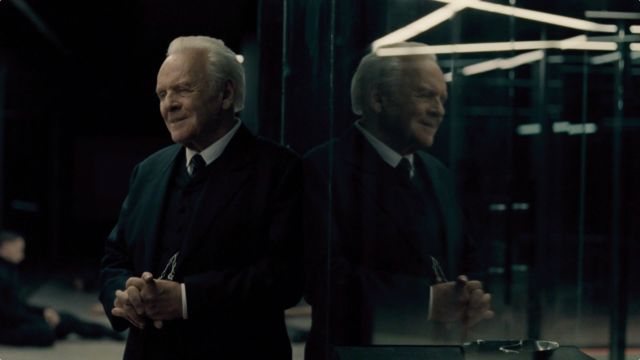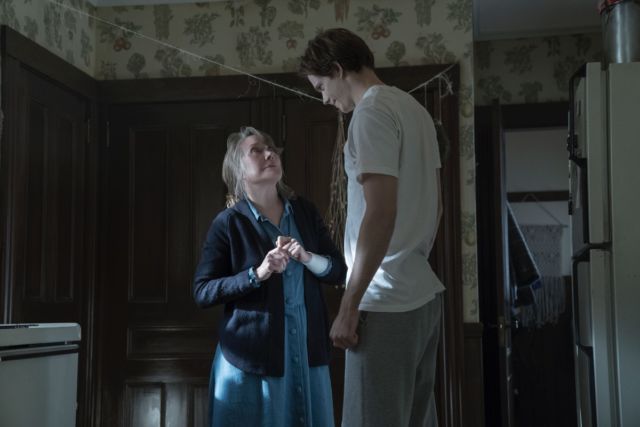We are in the era of “peak TV,” and between the major networks, cable channels, premium services, and streaming platforms, the TV landscape has never been more richly varied. This year’s crop of our favorite small screen moments reflects that diversity, from network sitcoms and prestige dramas to adult animated series and sci-fi favorites—and pretty much everything in between. In no particular order, here are the shows that engaged our heads and hearts this year.
The Good Place on time in the afterlife
There is nothing quite like The Good Place. A half-hour sitcom that explores the philosophical roots of ethical behavior in a bizarro version of the afterlife? Which tripping network executive greenlit that? We’re very glad someone did, because the show has been a sheer delight since it premiered in September 2016.
Kristen Bell stars as Eleanor Shellstrop, who dies and finds herself in an afterlife called “The Good Place,” managed by Michael (played by national treasure Ted Danson), who is enamored of humans and all their petty foibles. But Eleanor on Earth was by her own admission pretty much a selfish trash bag of a human being, and she thinks she’s been sent there by mistake. Season one’s final twist completely blew up the show’s original premise.
Season two dug deep into the question of whether it is possible for a damned soul to become a better person after death, via the study of moral philosophy. Name one other sitcom that features classroom lectures on Immanuel Kant’s categorical imperative, Aristotle, Kierkegaard, and T.M. Scanlon’s seminal text What We Owe Each Other. That season ended with another radical reset: Eleanor, Chidi (William Jackson Harper), Tahani (Jameela Jamil), and Jason (Manny Jacinto) are given one more chance to become better people on Earth. After a wobbly start, the third season turned out to be just as strong and surprising as its predecessors.
True, the season lacked an instant-classic moment like Michael’s brilliant-but-bloody simulation of the Trolley Problem, which will always be my favorite. But we got plenty of other delightful gems, like Michael’s mind-bending mini-tutorial about how time works in the afterlife in the episode “Jeremy Bearimy.” Time isn’t linear in the afterlife. Apparently it “doubles back and loops around,” and the resulting timeline just happens to look like the signature of the name Jeremy Bearimy. (The dot over the “i” is Tuesdays. And also July. And occasionally never.) “I don’t know what to tell you,” Michael says to the bemused crew. “That’s the easiest way to describe it.”

Westworld and killing all humans
The second season of Westworld didn’t draw the same level of praise from critics or vocal fans as the first. Yes, it’s needlessly baroque, nearly to the point of being impenetrable. Yes, the layering of the plot means you really do need to watch every episode more than once to get the full measure of what’s going on. Yes, a timeline diagram really does help. (That link will completely spoil everything in both seasons one and two, so click with caution.) In spite of all of those points and many others raised by the beautiful lunatics over at /r/westworld, I still think it’s the best TV show of 2018, and I can’t wait for season three.
For all its needless complexity and logical leaps, Westworld is the only thing I’ve watched in years that’s gotten me to tune in the moment it airs because I couldn’t wait even one extra second to find out what happens next (not even Game of Thrones gets my eyeballs the day it airs). And no episode this season delivered quite the “HOLY CRAP WHAT DID I JUST WATCH” hammer blow of episode seven, “Les Écorchés.”
The long-promised direct confrontation between Dolores’ host army and the Delos private military forces at the Mesa takes up a significant chunk of the episode, and it’s great, but the real showpiece is the return of Anthony Hopkins’ Dr. Robert Ford—a misanthrope in the truest sense. The episode brings into further focus Ford’s pseudo-nihilistic supervillain thesis: that humanity, as a product of nothing more than evolution, is inherently valueless. We are crude hunks of self-animating meat—obstacles standing in the way of the hosts’ path to true self-actualization. It’s time for us to die and for the hosts to inherit the Earth, because in Ford’s mind, only a true “original work” has worth. The hosts, as created beings, are such a work.
It’s the same contention both Bernard and Dolores return to throughout the season: only that which is irreplaceable is real. Evolution can crap out life anywhere. The world is full of it. It’s meaningless. But the hosts—ah, now, there’s a truly unique thing.
The guy’s crazy, but man, that conceit makes for some compelling fiction.

Dealing with dementia on Castle Rock
Castle Rock, the new horror anthology series from Hulu inspired by the works of Stephen King, surprised me by becoming one of my favorite breakout shows this summer. The pilot opens with the suicide of the local prison warden and the discovery that he secretly kept a young man—played by IT actor Bill Skarsgård and known only as “the Kid”—captive for decades. Not only has the Kid not aged, but violent outbreaks seem to follow in his wake. Attorney Henry Deaver (André Holland) returns to his childhood home about the same time and gets swept up in the mystery while dealing with psychological fallout from his past.
Henry is also struggling with what to do about his adoptive mother Ruth (Sissy Spacek), whose age-related dementia is rapidly worsening. Spacek’s devastating portrayal of an aging woman who has become unmoored in time hits its zenith in the episode “The Queen”—the most beautifully constructed, superbly acted hour of television you’ll likely see this year.
The entire episode is told from her point of view as she walks out of a conversation in the present and into a different conversation in 1991. Showrunner Sam Shaw’s own mother suffered from dementia and died unexpectedly a few days after he started writing the series. The episode draws on insights from his experiences. For instance, Ruth uses chess pieces scattered about the house to anchor her in reality, a detail inspired by Shaw and his sister going through their mother’s belongings and recognizing the talisman-like nature of a loved one’s personal effects.
There’s plenty of other strange goings-on and moments that tug at your heart-strings in Castle Rock, with one heck of a twist in the last two episodes (and a quintessentially King-like ending). But in the end, it’s the quiet, understated horror of “The Queen” that has stayed with me the most.
Listing image by BBC America
https://arstechnica.com/?p=1422273

